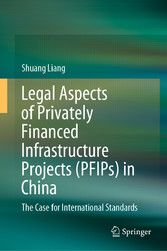Legal Aspects of Privately Financed Infrastructure Projects (PFIPs) in China - The Case for International Standards
von: Shuang Liang
Springer-Verlag, 2020
ISBN: 9789811568039
, 209 Seiten
Format: PDF
Kopierschutz: Wasserzeichen
Preis: 96,29 EUR
eBook anfordern 
Mehr zum Inhalt

Legal Aspects of Privately Financed Infrastructure Projects (PFIPs) in China - The Case for International Standards
This book discusses the reform and improvement of Chinese legislation on Privately Financed Infrastructure Projects (PFIPs), the goal being to help its implementation in China satisfy international standards. In this regard, current Chinese laws are found to be insufficient when it comes to reducing risks to PFIPs, due to certain shortcomings. Therefore, the corresponding legislation must be reformed and improved.The Legislative Guide and Model Provisions drafted by UNCITRAL are discussed as the international standards that can effectively guide this reform; other countries' laws on PFIPs provide supplementary reference material.Given the rapid rise in the use of PFIPs in China, this book offers a strong theoretical basis for improving Chinese legislation. It also provides general suggestions that can be applied to the reform of laws on PFIPs in any country.
Shuang Liang, was respectively awarded LLM degree by the University of Birmingham and PhD degree by the University of Leeds. She passed the solicitor examinations in the University of Law and was trained in the law firm Taylor Wessing LLP and Gateley LLP. She completed her ten years UK studying and working life in 2016 and came back China and joined into the Southwest University of Political Science and Law as a lecturer. Her research interests range from International investment law to international construction law, EU law, China law, etc. She was borrowed by the Ministry of Foreign Affairs, PRC during 2018. Since she returned university at the late of 2018, she focused on writing this book as an conclusion of the her previous research.









